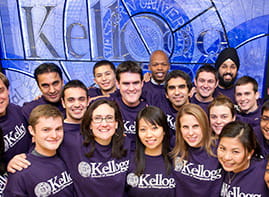The former U.S. Secretary of the Treasury offers his views on crisis leadership, regulation and his ‘biggest mistake’
1/26/2011 - “No institution is too big to fail,” said Henry M. Paulson, former U.S. Secretary of the Treasury, during a Jan. 18 conversation at the Kellogg School. But many are too big to liquidate quickly if they run into trouble.
As a result, the former Goldman Sachs chairman and CEO advised creating “not more [financial] regulation, but better,” singling out the new authorities provided in the Dodd/Frank legislation, which should give regulators the emergency powers to wind down a failing non-bank outside of the bankruptcy process.
Speaking before a capacity audience of nearly 1,000 students, faculty and staff, Paulson answered questions related to his service as head of the U.S. Treasury from July 2006 until January 2009 — a tenure that correlated with the greatest U.S. financial crisis since the Great Depression. During that time, Paulson was one of the most public faces of the economic team tasked by President George W. Bush with preventing the economy’s collapse.
Fielding a range of questions from Kellogg School Finance Professor
Janice Eberly, who moderated the discussion, Paulson offered comparisons between the private sector and government.
Government is “unwieldy,” and everything in Washington is either intellectually or politically challenging, he said. One reason why private sector leaders often fail to transition effectively to public service roles, Paulson noted, is that some are “used to being king” within their organizations. This attitude can be a liability when working to design and advance complex legislation on Capitol Hill.
 |
| Following his lecture, former U.S. Treasury Secretary Henry M. Paulson spoke with students at the Kellogg School. |
| Photo By Nathan Mandell |
As a result, political leaders must build consensus among diverse groups, just as business leaders do. “Even the president has to build consensus,” Paulson said, adding that while “it takes a different mindset” to succeed in D.C.’s charged partisan world, much of his job there called upon the same analytical and managerial skills that he used on Wall Street.
“You have to be a good listener, an advocate for your ideas, find common objectives and drive very hard to get things done,” said Paulson, a former member of the Kellogg Dean’s Advisory Board. The best CEOs — and politicians — get a really good team around them and learn to get buy-in for their ideas. And, they build relationships based on trust.
When asked whether he thought American politics had grown more polarized since his days as a staff assistant to President Nixon in the White House Domestic Council, Paulson said he wasn’t sure. The level of civility may be about the same now as then, he offered, but “the pace of change is accelerating, so it’s now more important to get difficult, important things done if America is to stay competitive … and it seems almost impossible to do so without a crisis” spurring the effort.
Recalling his leadership at the Treasury, Paulson said he and his team were confronted with a crisis born of misguided government policies in areas such as housing, from systemic failures in risk management across the financial system, as well as an outmoded regulatory system. The complexity of financial products contributed to problems, including “the biggest common failing” among big financial institutions: not understanding liquidity.
This complexity, coupled with a fragmented, outdated regulatory structure and inadequate authorities for dealing with failing non-banks, also meant that those combating the financial crisis were working with only partial information about what went wrong and with limited authorities to best to fix the problems.
“For a difficult decision, CEOs never get all the information,” Paulson said. “In a crisis, you have to weigh the cost of inaction against doing something that you know is imperfect.”
Paulson said that while his team “didn’t know all the unintended consequences,” they were sure that inaction would lead to a catastrophe.
“We won’t have a market left to protect, if we don’t take action,” Paulson recalled telling senior leaders in business and government. “We made some mistakes, but with the benefit of hindsight, I now believe all the big decisions we made were the right ones.”
One area where Paulson expressed regret was his inability to communicate his strategy more broadly so that the public had a better understanding of what the administration was doing to repair the economy.
“I never was able to make the public understand the connection between Wall Street and Main Street,” Paulson said. At the same time, he said that he was in constant communication with bankers and regulators during the crisis, working to create a solution.
“I didn’t cut myself off from the world during the crisis,” he said. “When things are moving fast and you have to make fast decisions, you must find out how to truncate processes and still make good decisions.”
Paulson’s visit was the latest in Kellogg’s Distinguished Lecture Series, presented by the school’s Office of the Dean and the Kellogg Business Leadership Club.






